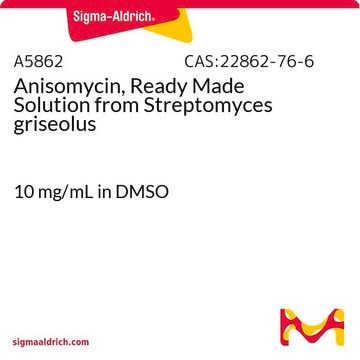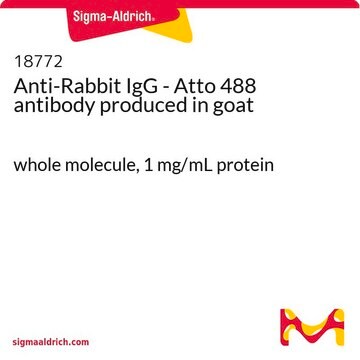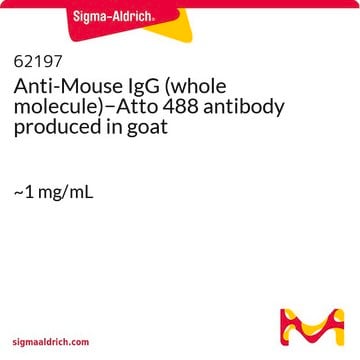176880
Anisomycin, Streptomyces griseolus
Strongly activates stress-activated protein kinases (JNK/SAPK) and p38 MAP kinase in mammalian cells.
Synonym(s):
Anisomycin, Streptomyces griseolus, 2-( p-Methoxybenzyl)-3,4-pyrrolidinediol-3-acetate, 2-(p-Methoxybenzyl)-3,4-pyrrolidinediol-3-acetate
About This Item
Recommended Products
Quality Level
Assay
≥98% (TLC)
form
solid
manufacturer/tradename
Calbiochem®
storage condition
OK to freeze
color
white
solubility
DMSO: 100 mg/mL
methanol: 50 mg/mL
shipped in
ambient
storage temp.
2-8°C
InChI
1S/C14H19NO4/c1-9(16)19-14-12(15-8-13(14)17)7-10-3-5-11(18-2)6-4-10/h3-6,12-15,17H,7-8H2,1-2H3/t12-,13+,14+/m0/s1
InChI key
YKJYKKNCCRKFSL-BFHYXJOUSA-N
General description
Warning
Reconstitution
Other Notes
Kardalinou, E., et al. 1994. Mol. Cell. Biol.14, 1066.
Kyriakis, J.M., et al. 1994. Nature 369, 156.
Sanchez, I., et al. 1994. Nature 372, 794.
Shinohara, K., and Oka, T. 1994. NeuroReport 5, 2201.
Kochi, S. K., and Collier, R.J. 1993. Exp. Cell Res.208, 296.
Legal Information
Signal Word
Danger
Hazard Statements
Precautionary Statements
Hazard Classifications
Acute Tox. 3 Oral
Storage Class Code
6.1C - Combustible acute toxic Cat.3 / toxic compounds or compounds which causing chronic effects
WGK
WGK 3
Flash Point(F)
Not applicable
Flash Point(C)
Not applicable
Certificates of Analysis (COA)
Search for Certificates of Analysis (COA) by entering the products Lot/Batch Number. Lot and Batch Numbers can be found on a product’s label following the words ‘Lot’ or ‘Batch’.
Already Own This Product?
Find documentation for the products that you have recently purchased in the Document Library.
Our team of scientists has experience in all areas of research including Life Science, Material Science, Chemical Synthesis, Chromatography, Analytical and many others.
Contact Technical Service








